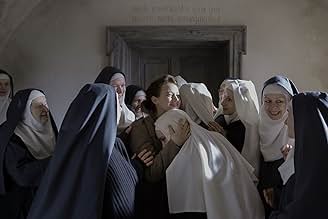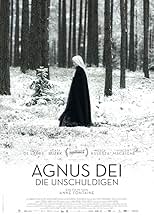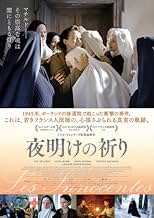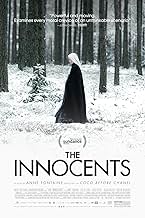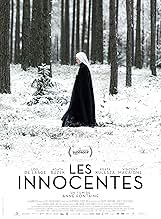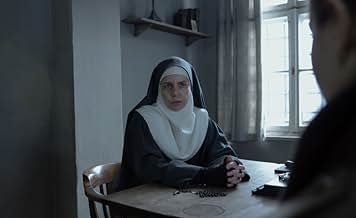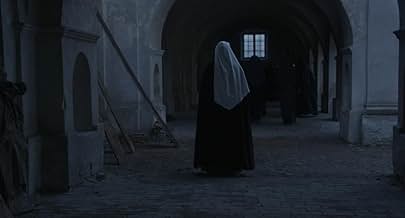Eine junge französische Ärztin, die 1945 in Polen für das Rote Kreuz arbeitet und Überlebenden der deutschen Konzentrationslager hilft, entdeckt beim Besuch eines nahegelegenen Klosters mehr... Alles lesenEine junge französische Ärztin, die 1945 in Polen für das Rote Kreuz arbeitet und Überlebenden der deutschen Konzentrationslager hilft, entdeckt beim Besuch eines nahegelegenen Klosters mehrere hochschwangere Nonnen.Eine junge französische Ärztin, die 1945 in Polen für das Rote Kreuz arbeitet und Überlebenden der deutschen Konzentrationslager hilft, entdeckt beim Besuch eines nahegelegenen Klosters mehrere hochschwangere Nonnen.
- Auszeichnungen
- 3 Gewinne & 13 Nominierungen insgesamt
Empfohlene Bewertungen
Whenever you hear the word/abbreviation 'WWII', it always bound with nazi Germans. Since this tale takes place just after the war, when the Soviet took over the Poland from them, it is set to reveal one of the extremely hidden secrets. Just imagine how secret it is, like you have read many books and have seen many films regarding the WWII, but you have never heard about this, until now. It is a heart rending tale, but the thing is everything's about the aftermath, how they handled their state of condition.
Mathilde, the French doctor is fetched by a nun from the nearby convent is shocked when she reached there to see most of them are in the final stage of their pregnancy. They were sexually abused by the Soviet soldiers, but now she as to keep it quiet as requested by the mother superior. She's being an atheist and to whom she's treating, the believers, is exactly the opposite kind. But not just her, the nuns as well put aside their differences to overcome their situation.
❝For us nuns, the end of the war does not mean the end of fear.❞
It's right on the coldest winter, does not tell about the original violence, but there's still a few incidents about the army atrocities, how they treated innocent nuns, even the Red Cross members. But remember nothing was the actual depiction. It would have been even better if it was a documentary film. Doing some research and telling us the tale, reading exactly as what was written in the diary. But the film was not bad, except the scene to scene, event to event it was very slow to move, except right on the point.
The story has a twist, but it was not like very powerful. It depends on how you would consider it. Because for me, I felt it was too cruel, hard to take on. The story about church people means, you would expect a gentle kind. Or even in such situation, as in this film, to react as much as possibly generously as what they're known for. But in the first place, it was no ones fault. They all fighting for the same reason, especially keeping the outside world in mind, each one reacted differently. So it is understandable, but not all the acts were respectable.
As the director said in her interview, this is a period film, but pretty much the same in the contemporary world where war is on. The violence against the innocent women. So it is a debatable topic. And if it was directed by some male filmmaker, he might have risked with the violences in the flashback scenes to bring more depth in the narration. The present film is kind of compromises on that, but still not easy to watch everything it shows. Particularly for the families. Great performances by all. One of the best films on this theme and of the year. The film is not to be ignored. Despite not about the war, but just like 'Under Sandet', about the following event.
8/10
This quiet little story of Russian soldiers raping Polish nuns balances that trend in movies. Set after the war in 1945 as the Russians take over Poland, but the French Red Cross is still there, it's a reminder that there are always a few good people in the midst of the thugs. May the young French actress Lou de Laage have a long and happy career. She certainly has a good start here.
Besides excellent acting and story telling, maybe it's the filming and mood created by this movie that makes it so good. You would think it painful to watch considering the subject, but it's not. Great shots of snowy, muddy roads and rambling old trucks offset by warm glow of music in a candle lit bar. Then the nuns, in a bleak cold stone refuge, yet in spite of their hardship, they are full of heart and life.
The acting, filming and the seriousness of this were all done well. It manages to catch your attention and never gives the viewer the opportunity to look away. I'm glad I took the time to watch it.
The year is 1945, just after the end of World War II. A French Red Cross unit is sent into Poland. Their mission was to care for French survivors of the camps. Among the Red Cross staff is a young medical student, Mathilde Beaulieu, played by Lou de Laâge. Early in the film, we learn a terrible secret about the nuns in a nearby convent. Many of them are pregnant, because they were raped by Russian soldiers. Mathilde learns of this, and she is allowed to enter the convent, where she meets Sister Maria, a French-speaking nun played by Agata Buzek. To go further with the plot would diminish the movie, so I'll stop at that point. Let me just say that the situation is even worse than it seems.
This is a movie that is not to be missed. Yes, it's grim, but postwar Poland was a grim place. The film takes place in winter, so snow covers everything, and even the Red Cross staff is miserable. Obviously, for the nuns in the convent, everything is much more terrible.
The acting in the film by the two lead actors is outstanding. Also, the ensemble acting was wonderful. There were no weak links, and no obviously staged scenes. Everything looked real--cold, dark, and threatening--but real.
This is one of those movies where many frames could be lifted from the film and used as a photograph. My compliments to cinematographer Caroline Champetier, who did a brilliant job.
We saw this film at the excellent Little Theatre in Rochester, NY. It will work well enough on the small screen, but the large screen gives you a better sense of the isolation of the convent. The nuns don't expect help from outside. They only expect harm to come to them. Mathilde is the exception, and they (and we) understand that. Small screen or large screen, don't miss this movie!
P.S. The film is based on the experiences of a French doctor--Madeleine Jeanne Marie Pauliac. She was a member of the French Resistance, and did, indeed work tirelessly in Poland after the war. For artistic reasons, director Fontaine focused on Dr. Pauliac's work with the pregnant nuns. The rest of her accomplishments would also make a fascinating movie.
Wusstest du schon
- WissenswertesBased on the true story of Madeleine Pauliac, renamed Mathilde Beaulieu in the film, during her time working as a doctor in Poland. The story was brought to the attention of producers by Pauliac's nephew, Philippe Maynial, who had her diary.
- Zitate
Maria: You know, faith. At first, We're like a child that his father holds by his hand, who feels safe. A moment comes and I think he always comes where the father will let you go. We're lost, alone in the dark. We call, nobody answers. We're getting ready, we're surprised. We're hit in the heart. That's the cross. Behind all joy, there is the cross.
- SoundtracksVox clara ecce intonat
Written by Hildegard von Bingen
Performed by Elsa Papatanasios, Emmanuelle Huteau, Marie George Monet and Nathalie Liess
Top-Auswahl
- How long is The Innocents?Powered by Alexa
Details
- Erscheinungsdatum
- Herkunftsländer
- Offizielle Standorte
- Sprachen
- Auch bekannt als
- Agnus Dei - Die Unschuldigen
- Drehorte
- Produktionsfirmen
- Weitere beteiligte Unternehmen bei IMDbPro anzeigen
Box Office
- Budget
- 6.400.000 € (geschätzt)
- Bruttoertrag in den USA und Kanada
- 1.065.665 $
- Eröffnungswochenende in den USA und in Kanada
- 30.896 $
- 3. Juli 2016
- Weltweiter Bruttoertrag
- 7.400.301 $
- Laufzeit
- 1 Std. 55 Min.(115 min)
- Farbe
- Sound-Mix
- Seitenverhältnis
- 1.85 : 1





